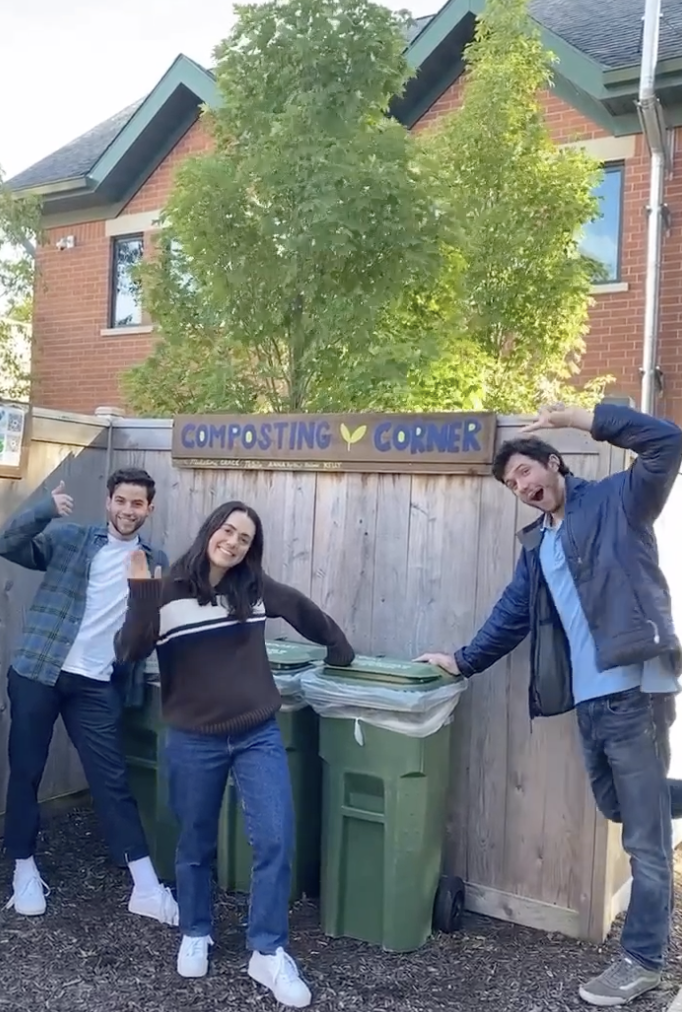Cats Who Compost promotes sustainability, composting on campus
Everyone who joins is very committed to the environment, to sustainability and to being able to provide a service for Northwestern students.”
Quinn Correa
Cats Who Compost Executive Member Quinn Correa
Student group makes being zero-waste at Northwestern easy
Weinberg junior Kelly Teitel began composting her junior year of high school.
“When I was at home, I really noticed it made a huge difference in terms of reducing the amount of trash waste that we had, even just as a family of four,” Teitel said.
As a first year, Teitel learned that Northwestern didn’t have a composting program in place, so she turned to Cats Who Compost (CWC), founded by Ella DeBode (21’ SESP).
CWC has come a long way since its founding, now providing buckets to students for composting, compostable materials to other student organizations and putting on zero-waste events that demonstrate the feasibility of sustainability.
“Cats Who Compost is low-stakes commitment-wise, but high stakes when you want it to be,” CWC exec member and Weinberg junior Quinn Correa said. “Everyone who joins is very committed to the environment, to sustainability and to being able to provide a service for Northwestern students.”
The group’s main initiative is managing three composting sites across campus: outside of Sheil Catholic Center, by Hillel and behind the University Christian Ministry.
CWC’s focus on composting is impactful because a sizable portion of carbon emissions in the United States come from food waste, according to CWC exec member and Communication junior Katie Cummins.
“Every time you put a banana peel in the compost instead of putting it in the trash, you're reducing your carbon footprint by a decent amount,” Cummins said. “That's one of the most efficacious things you can do to make your carbon footprint lower.”
 CWC provides students with gallon buckets with lids to prevent smell in exchange for a $5 deposit (refunded when the bin is returned) and an additional $5 for each quarter the composting bucket is used. To request a compost bucket, fill out this form.
CWC provides students with gallon buckets with lids to prevent smell in exchange for a $5 deposit (refunded when the bin is returned) and an additional $5 for each quarter the composting bucket is used. To request a compost bucket, fill out this form.
Student organizations can also request a compost bin for events. For $10 an hour, the bin is dropped off and picked up by a CWC member, helping decrease the waste of events across the community.
The group also provides information on sustainable event hosting, complete with links to compostable plates and utensils.
“Cats Who Compost seeks to fill in those gaps and make sure that people have access to composting resources that should be accessible,” Correa said.
Some of CWC’s projects include working with Mayfest to make composting available on Dillo Day and advocating for the composting bins implemented at Norris earlier this school year. CWC members volunteered to monitor the bins when they were first installed to facilitate correct composting methods.
Another recurring CWC partnership brings them together with Wild Roots, a gardening organization on campus, and Campus Kitchen, a group that redistributes extra food from Northwestern’s dining halls to people in need. The three groups recently collaborated on their second annual zero-waste event: the Snowstainability Ball.
“We wanted an opportunity for students to meet other like-minded students in a relaxed environment,” Teitel said. “We also want to demonstrate to other student organizations that you can, as a student org, host a zero-waste event.”
The event, free of charge to students, had food and live music, but most importantly, produced very little trash. Teitel said the Snowstainability Ball in 2023 produced only enough waste to fit inside a clementine bag, meaning everything else was recycled or composted.
CWC is constantly working on projects to bring more sustainability to campus, and its leadership is open to suggestions.
“If you want to be more involved and have any ideas, anything creative, anything you can execute, you can help out the club,” Cummins said. “We’ll support anyone who’s interested in reducing their waste.”
Getting involved with CWC can be as simple as signing up for the newsletter or Slack channel, following them on Instagram or attending the group’s weekly meetings. For more resources on composting, see CWC’s Linktree.
